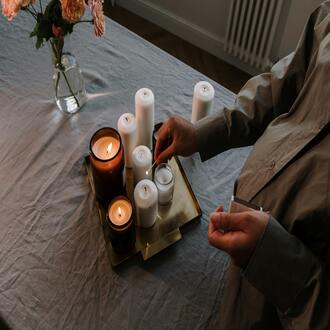Transcription Social skills
Throughout these videos we analyze the importance of empathy and keys to improve communication. It seems that everything has already been said, but why would we talk about social skills now?
In the challenge we recently set ourselves, we interacted with a certain number of people. We developed our speaking skills, i.e. we practiced the skill!
Let's remember that we had the mission to interact, having a new base: active listening, respect, among others.
Summary.
Among the skills to be taken into account are what we have already worked on: empathy, listening with their respective levels, security, self-esteem and being able to help others. The term "social skills" is defined as the personal abilities and tools that we possess to interact with others. A person with social skills manages a conversation, always acts with respect and knows how to say "no" correctly. He knows his limits and does not commit himself to offer something he does not have. What do we still need to understand, then, to get closer to the perfection of our communication skills?
Comfort zone.
We have yet to leave our comfort zone, which we have discovered to be the familiar thought or behavior that provides us with security. Leaving this space allows us to change.
Along the same lines of the challenge proposed recently, we will establish relationships with several people a week, but this time try to get out of your personal space. Go crazy, if you don't like to party, go. The important thing is to get out of that circle called beliefs, if you only relate to the same type of people, you will continue to affirm what you believe. Dare to be in a group with people who do not think anything like you, this is where you will really discover how much you have improved in active and empathic listening.
Putting aside that comfort zone might make you feel uncomfortable, but in the beginning, that's the idea. With the intention of demonstrating what we have learned, we broaden our social spectrum. Say no to laziness!
You've never visited a museum before in your life. Perfect. What's the next step? Seek to strike up a conversation with someone: If a person is looking at a painting, for a long time, stand next to them and after a few moments ask them:
-What did the author want to convey with this work?
People love to give their opinion, it's like a way to show them who they are. Use it to your advantage.
Demonstrate personality.
Dare to chat and improvise on the first thing that comes to your mind. Just don't nod at everything. At some point, by divine law, you will have to think differently. We are not robots. Include a personal opinion:
-What a coincidence, I like Picasso too but....
The person will feel that besides listening to you, you have your own criteria and that, dear friend, shows personality. If on top of that special touch of being yourself, you reflect kindness and respect, you have already won the person over. Provided that there is reciprocity on both sides and that he/she does not want to talk to you just to fill a void, momentary loneliness or boredom.
Voice projection.
Yes, you have to keep improving the projection of your voice. What emotions do you want to convey? Joy? Focus on feeling the emotion and then with tone and vocalization, express it. If you keep getting asked five times in a row: what? You have to keep improving and observing the environment better.
If you start talking to a woman in the middle of an electronic music party, as a matter of logic, the noise will prevent you from conveying what you want to convey accurately. Therefore, try to find a space where those obstacles that prevent you from understanding each other are not so prevalent. If your companion is standing, do not remain seated, the voice is best projected with the correct posture.
Posture.
We continue with the idea of making the other person see that we are interested in what he/she is telling us. How should our posture be? Exactly, open, without hands in pockets or yawning every two seconds.
Paraphrase the last sentence, summarize what you have understood so far and if it is not clear, ask again. Remember not to be distracted by the hundreds of stimuli you are being bombarded with every day. Your attention must be 100% on the person. What if at that moment you are not available? Say:
-I can't attend to you now, as soon as I get free I'm with you.
The idea is that you will start practicing more, it's just a matter of time.
Vulnerabilities.
If your intention is to develop a bond with the person, it would be advisable, to a certain extent, to show your vulnerabilities. Don't abuse this method. I don't mean that you should start crying or elaborate a three-hour dramatic scene, but let your fears come to the surface.
If the other person is listening to you, they will give you their point of view, which will help you rework certain irrational beliefs you may have. But if you are too intense, you could see yourself as "too vulnerable". The right thing is the middle ground, open up enough to show your "humanity".
social skills




